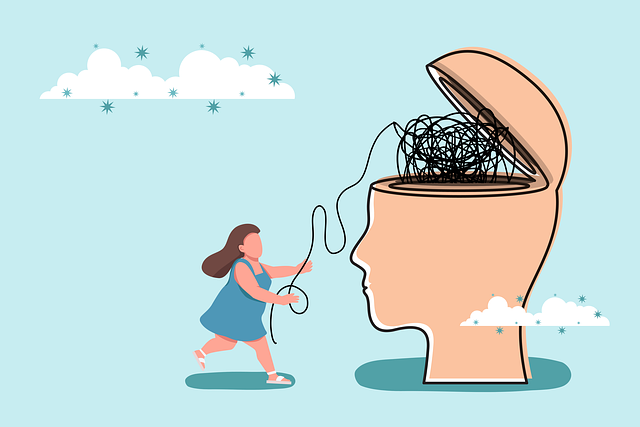Louisville Mental Health Evaluations and therapy, focusing on the Resourceful Facilitation Method (RFM), offer a comprehensive approach to building resilience. This holistic method combines structured exercises with social skills training to manage stress, address past experiences, and set future goals. By integrating cognitive-behavioral strategies, mindfulness, and emotion regulation skills, RFM equips individuals and healthcare professionals with tools for emotional well-being. This tailored approach not only enhances mental health recovery but also creates a supportive community where vulnerability is normalized, ultimately strengthening Louisville's collective resilience.
“Unleash your inner resilience with an exploration of RFM (Recovery-Focused Goals and Motivational Interviewing) and its profound impact on mental wellness. This article delves into the transformative power of RFM, particularly through the lens of Louisville Mental Health Evaluations, offering a roadmap to building resilience.
We’ll uncover how structured exercises can empower individuals, with a focus on therapy integration for long-lasting positive outcomes. Discover practical strategies to navigate challenges and foster mental robustness, all while exploring the innovative approach of Louisville Mental Health Evaluations and its therapy offerings.”
- Understanding RFM and its Role in Mental Health
- Louisville Mental Health Evaluations: Unlocking Resilience
- Building Resilience through Structured Exercises
- Therapy Integration for Lasting Impact
Understanding RFM and its Role in Mental Health

In the realm of Louisville mental health evaluations and therapy, Resourceful Facilitation Method (RFM) stands out as a powerful tool for building resilience. RFM is a structured approach designed to enhance individuals’ coping mechanisms and promote emotional well-being. By focusing on past experiences, current challenges, and future goals, RFM helps clients develop effective strategies to navigate life’s complexities. This method is particularly valuable for those seeking stress management and mood management solutions, as it equips them with the skills needed to confront and overcome mental health obstacles.
Incorporating RFM into therapy sessions enables practitioners in Louisville to offer personalized treatment plans that address not just symptoms but also the underlying factors contributing to distress. This holistic approach facilitates social skills training, encouraging individuals to build stronger connections and adapt more positively to their environments. With its emphasis on resilience, RFM plays a pivotal role in fostering mental health recovery and enhancing clients’ overall quality of life.
Louisville Mental Health Evaluations: Unlocking Resilience

Louisville Mental Health Evaluations play a pivotal role in unlocking individual resilience, offering valuable insights into one’s emotional and psychological state. These evaluations are not just diagnostic tools but powerful catalysts for change, guiding individuals towards effective therapy and crisis intervention strategies. Through comprehensive assessments, mental health professionals can tailor treatments to meet unique needs, ensuring that each person receives the appropriate support for their journey towards emotional healing processes.
The process involves meticulous analysis of symptoms, personal history, and environmental factors, which are crucial elements in understanding and addressing underlying issues. This data guides advocacy efforts, influencing mental health policy analysis by highlighting areas requiring improvement. By integrating Louisville Mental Health Evaluations into therapy practices, we can foster a more resilient community where individuals are equipped to navigate life’s challenges effectively.
Building Resilience through Structured Exercises

Building resilience is an essential aspect of maintaining emotional well-being, especially in high-pressure fields like healthcare. Louisville mental health evaluations and therapy play a crucial role in identifying individuals’ strengths and weaknesses, tailoring exercises to suit their unique needs. Structured resilience-building exercises, integrated into therapy sessions, offer a systematic approach to enhancing coping mechanisms and stress management. These techniques are particularly beneficial for healthcare providers who often face intense work environments, high patient loads, and emotional demands.
Through focused practices, professionals can learn to manage mood, prevent burnout, and cultivate a more positive mindset. The exercises may include cognitive-behavioral strategies, mindfulness techniques, and emotion regulation skills training. By participating in these structured activities, individuals gain practical tools to navigate challenging situations, fostering a sense of control and resilience. This proactive approach to mental health promotion can significantly contribute to the overall well-being and longevity of healthcare providers in Louisville.
Therapy Integration for Lasting Impact

Incorporating therapy into resilience-building exercises is a powerful strategy for lasting impact, especially in Louisville mental health evaluations and therapy settings. Beyond simple coping mechanisms, integrating therapeutic techniques allows individuals to process and overcome challenges that may have seemed insurmountable. This holistic approach leverages professional insights to foster emotional growth and build internal strength.
By combining structured resilience-building activities with the guidance of trained therapists, participants can address underlying mental illness stigma reduction efforts and trauma support services. Such a comprehensive method not only enhances individual well-being but also encourages a supportive community where vulnerability is normalized, ultimately strengthening the collective resilience of individuals within Louisville’s mental health landscape.
Louisville mental health evaluations and structured therapy exercises play a pivotal role in building resilience. By understanding RFM (a key indicator of mental health) and integrating therapeutic practices, individuals can unlock their inherent resilience, fostering a more robust coping mechanism for life’s challenges. This comprehensive approach ensures lasting impact, enabling folks to navigate the hustle and bustle of daily life with enhanced emotional fortitude.














